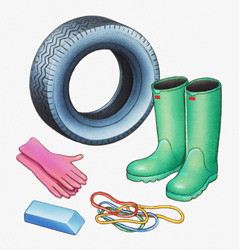Quickly and safely getting up to speed
Ethylene thiourea (ETU)-based accelerators have been the industry standard for speeding the vulcanisation process (acting as an accelerator). However, ETU has now been classified as a suspected human carcinogen by various EU bodies. Its use is expected to be restricted or prohibited by the EU in the near future. Small and medium-sized enterprises (SMEs) working in the rubber sector will be particularly hard hit, particularly in the face of rising competition from Asian countries with less stringent health and safety requirements. A large consortium took advantage of EU investment to find a safe replacement for ETU. Scientists developed an eco-friendly and inexpensive alternative within the context of the project SAFERUBBER . The additive SRM102 demonstrated many important benefits. Chloroprene rubbers made with SRM102 have improved flow characteristics, much more easily filling the mould. This has potential to reduce both the mass of rubber used and the scrap generated. In addition, it is possible to reduce levels of zinc oxide, a vulcanisation activator. Optimisation of the SRM102 may also decrease the cure cycle for savings in time and energy consumption. Finally, results of studies of algae growth on samples produced with SRM102 suggest it is not toxic. Five factories in three countries tested processing of chloroprene rubber containing SMR102. Scientists found the additive to perform as well as or better than compounds containing ETU. In rubber manufacturing trials, SRM102 was shown to be a viable replacement for ETU. While technical viability is critical, commercialisation relies on the bottom line. Since the percentage of SRM102 required compared to rubber content is similar to that of ETU, the new additive is expected to have minimal effect on the final manufacturing cost. SAFERUBBER has delivered a safe and cost-effective alternative to the carcinogenic rubber vulcanisation accelerator additive ETU. The numerous European SMEs active in the sector stand to benefit tremendously. Technology will help them meet the challenge of increasing competition from Asian countries unlikely to be affected by stricter regulations.
Keywords
Vulcanisation, rubber, process accelerator, carcinogen, ethylene thiourea, additive, SRM102, chloroprene, chloroprene rubber, zinc oxide

